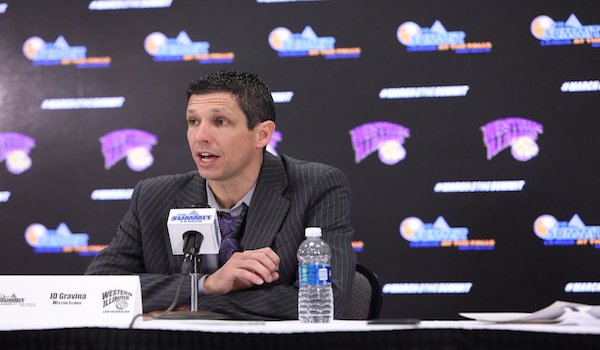When JD Gravina took over the Western Illinois program in 2011, the Leathernecks did not have a winning season during the five seasons prior to his arrival. Since then, Gravina has rebuilt a program that reached its first post-season berth and won its first post-season game in 2015-16. A big part of this successful rebuild is based around a high scoring offense that has resulted in his team’s owning the four highest scoring seasons in program history. Gravina’s success as a Head Coach is evident by the recent accomplishment of winning his 200th career game, with his program off to it’s best start in 11 seasons.
How did your successful experience leading the Quincy program at the Division II level prepare you to lead a Division I program at WIU?
I think working my way up from the high school level to NAIA to Division II and now Division I has provided me with really diverse experiences that have helped me at WIU. One of the key aspects of being a DII coach was understanding how to recruit, coach, and lead my team to develop well-rounded people and not just basketball players. Being successful at the DII level required the ability to balance athletics with life outside of basketball and encouraged me to ask myself questions regarding my player’s mental, social, and physical health. The DI world can sometimes be so one-dimensionally focused on wins and losses, but I’ve been able to keep that ability to balance other aspects of my player’s lives.
Looking back on your first few seasons as a Division I Head Coach, what insight can you provide to help other first-time Division I Head Coaches to enhance a smooth transition?
“To thine own self be true.” Getting hired as a Division I coach can be extremely exciting, but also overwhelming. Sometimes the natural reaction is to try to step it up. Many people completely change their coaching style, get more serious, or try to work ungodly hours. I can tell you there are good coaches at every level of basketball. Do what made you successful at your previous job and do it with passion.
Anytime you are transitioning to a new job, I think it is essential to make connections with people, not just your boss, your staff, or your team, but everyone. At the end of the day, this job is all about relationships. Sometimes it is hard because you have so much to do when taking a new job that you can forget to spend time with people. Introduce yourself to people in the community, other coaches in the department, AAU coaches, high school coaches, and other coaches around your league. Host a free clinic for young kids in your town. Say “thank you” to the person that cleans your building or the person from the physical plant working painting your locker room. Ask what you can do for them. Getting people invested in you and your program is by far the most important aspect of your future success.
After taking over a program that did not have a winning season during the five seasons prior to your arrival, what have been some keys to rebuilding the WIU program?
Rebuilding a program is tough. It takes a lot of patience, and a lot of humility. It’s easy to think you have a plan and to attack that plan, but realize there are probably a lot of nuances about your new program that you weren’t prepared for. It’s extremely tough, but you must give yourself some time to settle in before making too many important decisions. I’ve seen a lot of coaches slash and burn their current roster and rush to sign a slew of new players. It seems like this can often backfire. Treat the returners with respect and coach them up, then focus on quality recruits that are the perfect fit for your program. Don’t rush and settle for kids to fill your roster. Find quality kids that are going to take your program where you want it to go. This first group will be your leaders three to five years down the road!
What are some goals for your program during the next few months?
I strongly believe in process-oriented goals, not result-oriented goals. I’ve really enjoyed coaching this group and the success we’ve had so far. It’s amazing to look back and see where we’ve came from and look at where we are now. The number one thing is to continue to improve, even when things get tough. Our league is incredibly strong, and every single game will be a battle. It’s easy to play hard, be enthusiastic, and have fun when you are winning games and scoring a lot of points. The goal moving forward is to embrace battling every possession, fighting for rebounds, and doing the little things right. More than anything, this is an important time of the year to build character and leadership, especially in the face of adversity.
What advice do you have for someone who wants to make the transition from non-Division I Head Coach to Division I Head Coach?
Be in the present. I see so many coaches always looking for their next job, but end up getting fired because they already had one foot out the door. Be great at your current job and opportunities will present themselves.
Make sure you are enjoying what you are doing. Happiness won’t come with the next job or pay increase. Happiness will come when you love your job, your players, and life outside of basketball.
Network to get ideas and suggestions to make you a better coach, not just to suck up to your next potential employer. People see through those type of interactions. Have honest, insightful conversations with other people in your field and you’ll build quality connections that will most likely help your career.
Written originally for CollegeInsider.com on January 31, 2017.

